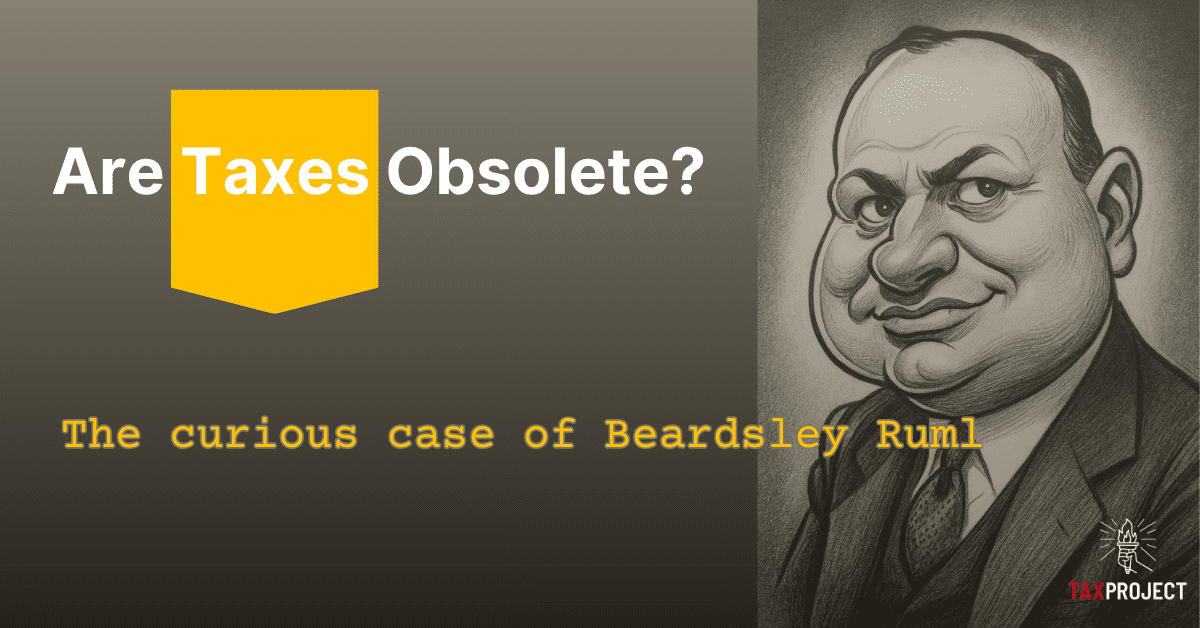Introduction
Taxation lies at the heart of all governments. It funds the services, institutions, and protections that define modern states. However, the question of how to tax fairly, efficiently, and effectively has been debated for centuries, even millennia. Few thinkers have had as profound an influence on this topic as Adam Smith, the 18th-century Scottish economist and moral philosopher whose seminal work, The Wealth of Nations (1776), introduced what are now known as the Four Canons of Taxation[1].
These principles — Equity, Certainty, Convenience, and Economy — continue to shape how modern tax systems are evaluated. In the United States, Smith’s ideas strongly influenced early American leaders including our Founders and remain embedded in the design of the federal tax code.
This article explores Smith’s life and intellectual context, the origin and meaning of the Four Canons, their influence on American political thought, and how the U.S. tax system measures up against these enduring principles.
Adam Smith: Architect of Classical Economics
Adam Smith (1723–1790) was a philosopher and economist born in Kirkcaldy, Scotland. Educated at the University of Glasgow and later Oxford, Smith became a professor of logic and moral philosophy and part of the period known as the Scottish Enlightenment. His early work, The Theory of Moral Sentiments (1759), examined ethics, human behavior, and the moral foundations of society.
But it was his 1776 masterpiece, An Inquiry into the Nature and Causes of the Wealth of Nations, that revolutionized economics[1]. In it, Smith laid the foundations for classical economics, championed free markets, and discussed the role of government. It was in this work that he formulated what are now referred to as the Four Canons of Taxation.
Smith was not an anarchist or anti-tax advocate. He believed that governments had vital roles to play — including defense, justice, education, and infrastructure[1]. To perform these functions, governments required funding. Thus, taxation was necessary, but it had to meet certain standards of fairness, predictability, and efficiency.
The Four Canons of Taxation
1. Equity: Tax According to Ability to Pay
“The subjects of every state ought to contribute towards the support of the government, as nearly as possible, in proportion to their respective abilities; that is, in proportion to the revenue which they respectively enjoy under the protection of the state.”[1]
Adam Smith
Smith’s principle of Equity suggests a proportional tax system. Those who earn more should pay more, not just in absolute terms but potentially in relative terms. This was a precursor to the concept of progressive taxation. Taxation should reflect a taxpayer’s ability to pay without creating undue hardship.
In America, these principles were deeply embedded in our Founders:
“The rich must contribute to the public expense, not only in proportion to their revenue, but something more than in that proportion.”[2]
Thomas Jefferson
“A just proportion of the public burdens should be borne by each individual citizen, according to his ability to contribute.”[3]
Alexander Hamilton
Today, the U.S. tax code uses a progressive income tax, aligning in principle with Smith’s idea of Equity, though debate continues over what constitutes a fair share, and Smith’s specific use of the word Proportion as relative to income versus the progressive system (beyond relative) that we have today.
2. Certainty: Clear and Predictable Obligations
“The tax which each individual is bound to pay ought to be certain, and not arbitrary. The time of payment, the manner of payment, the quantity to be paid, ought all to be clear and plain.”[1]
Adam Smith
Taxes should be transparent and not left to the whims of officials. A predictable and transparent tax system enables individuals and businesses to plan effectively and fosters trust in government.
This view was of “great importance” to our founders, that certainty, fairness, transparency and the ability of citizens to understand their taxes were embedded in our system.
“It is of the greatest importance that the business of revenue should be conducted with the utmost fairness, and that every citizen should understand the nature and extent of the tax to which he is subject.”[4]
Alexander Hamilton
U.S. tax laws today are formally certain, with statutory rates, schedules, and regulations. Every citizen understand their duties, when their taxes are due, and to a large extent how they are formulated. However, the sheer size and complexity of the tax code has been criticized for undermining this canon. The tax system is full of deductions, credits, special carve outs, and ambiguous language, often requiring professional assistance to interpret.
3. Convenience: Taxes Should Be Easy to Pay
“Every tax ought to be levied at the time, or in the manner, in which it is most likely to be convenient for the contributor to pay it.”[1]
Adam Smith
Tax collection should consider the circumstances of taxpayers. For example, collecting income tax via payroll withholding ensures that payment coincides with earnings. Again, our Founders believed in this concept, including Alexander Hamilton, our first Treasury Secretary.
“The mode of collecting taxes ought to be convenient to the people… suited to their habits and circumstances.”[5]
Alexander Hamilton
The U.S. tax system has improved on this front, with withholding the EZ form, e-filing, and installment plans, though filing remains burdensome and costly for many. Unlike many countries, the US Governments lack of a sponsored and free option for all citizens to file, or a pre calculated option for citizens to approve since the vast majority of all information is already known by the IRS has been a topic of debate and impacts this principle.
4. Economy: Minimize Cost of Collection
“Every tax ought to be so contrived as both to take out and to keep out of the pockets of the people as little as possible, over and above what it brings into the public treasury of the state.”[1]
Adam Smith
Smith was concerned not only with the tax burden itself, but with the administrative cost, economic drag, and opportunity for corruption in tax collection. Efficient systems maximize public revenue while minimizing compliance and enforcement costs.
America’s founders were also worried about this as well.
“The expenses of collection should be as little as possible… It is essential that the system of revenue avoid waste, corruption, and unnecessary cost.”[6]
Alexander Hamilton
Today, the IRS’s cost of collection is relatively low compared to many other nations (about 35 cents per $100 collected)[7], but the indirect compliance burden on taxpayers is high — estimated at over $300 billion annually in time and preparation costs[8].
Comparison Table: U.S. Tax System vs. Smith’s Canons
| Canon | Smith’s Standard | U.S. Implementation | Assessment |
|---|---|---|---|
| Equity | Taxpayers contribute proportionally according to their ability to pay | Progressive income tax system | America’s Progressive income tax meets the spirit to a large part, if not the direct implementation (Proportional), but other forms of regressive taxes dilute equity |
| Certainty | Tax obligations must be clear and predictable | Codified tax code, published schedules | The US has one of the more structured Legal Tax Codes in existence, but in practical terms the size and complexity undermines this principle. |
| Convenience | Payment should align with taxpayer circumstances | Withholding system, online filing, payment plans | The US system attempts to make it easy with e-Filing and EZ returns, but for complex filers it remains burdensome. |
| Economy | Minimize administrative and compliance cost | IRS efficient at collection; high compliance cost for taxpayers | The US has a fairly Efficient and automated collection system, although some will argue given the size and extent of the IRS [9], but high cost to taxpayers in time and prep |
Conclusion
Adam Smith’s Four Canons of Taxation remain a gold standard for evaluating any Government fiscal system. They represent not only economic logic but moral reasoning: that government should raise money fairly, predictably, conveniently, and efficiently. Almost 250 years ago, coinciding exactly with the US Semiquincentennial, Adam Smith’s Canons still stand as sound governance for all countries.
Incorporated implicitly into America’s founding philosophy, these canons influenced early debates on taxation and continue to frame modern discussions on tax reform. The U.S. system embodies many of these principles in structure, but often falls short in execution due to complexity, political compromise, and uneven application.
Smith’s legacy is not just a blueprint, but a framework that allows governments and citizens to ask questions: Is our tax system just? Is it efficient? And is it worthy of the public trust?
In that sense, the Four Canons of Taxation are not just economic principles — they are a moral test for government itself.
Citations
[1] Smith, A. (1776). An Inquiry into the Nature and Causes of the Wealth of Nations, Book V, Chapter II. https://www.econlib.org/library/Smith/smWN.html?chapter_num=40
[2] Jefferson, T. (1785). Letter to James Madison, October 28, 1785. Founders Online. https://founders.archives.gov/documents/Jefferson/01-08-02-0524
[3] Hamilton, A. (1791). Report on the Subject of Manufactures. Yale Avalon Project. https://avalon.law.yale.edu/18th_century/ham_man.asp
[4] Hamilton, A. (1787). Federalist No. 21. Congress.gov. https://www.congress.gov/resources/display/content/The+Federalist+Papers#TheFederalistPapers-21
[5] Hamilton, A. (1790). Report on the Public Credit. Yale Avalon Project. https://avalon.law.yale.edu/18th_century/ham01.asp
[6] Hamilton, A. (1787). Federalist No. 30. Congress.gov. https://www.congress.gov/resources/display/content/The+Federalist+Papers#TheFederalistPapers-30
[7] Internal Revenue Service (2023). IRS Data Book. https://www.irs.gov/statistics/soi-tax-stats-irs-data-book
[8] Tax Foundation (2022). Tax Compliance Costs and Economic Burden. https://taxfoundation.org/tax-compliance-costs-burden
[9] Politico, https://www.politico.com/news/2021/05/20/irs-funding-boost-489830











